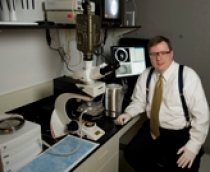Dr. Jens Karlsson Awarded NSF Grant to Research Zebrafish Oocyte Preservation
The National Science Foundation has awarded Dr. Jens Karlsson, Associate Professor of Mechanical Engineering, and Dr. Ali Eroglu of the Molecular Oncology Program at Georgia Health Sciences University, a $660,000, three-year grant to conduct interdisciplinary research into the cryopreservation of zebrafish oocytes. Dr. Karlsson will collaborate on this project with Dr. Angela DiBenedetto, Associate Professor of Biology, whose laboratory houses a zebrafish breeding facility.
“Zebrafish are emerging as an important experimental model for human biology, with the advantage of rapid rates of reproduction and development. As vertebrates, they are more closely related to humans than are common invertebrate animal models, such as fruit flies or nematodes, and therefore offer valuable insights into questions about medical disorders in humans,” says Dr. Karlsson. “While the ever-growing variety of available genetic strains are a benefit for science, the large number of specially bred fish populations can be difficult to maintain and protect from genetic drift or disease.”
As an alternative to keeping individual genetic strains of zebrafish segregated in myriad bulky aquarium tanks and maintaining these fish populations by continuous breeding, Dr. Karlsson and Dr. DiBenedetto are exploring the feasibility of freezing zebrafish embryos, which would allow convenient long-term storage in liquid nitrogen. Recently, they used a cryomicroscope with high-speed imaging capabilities to determine what happens to the fish embryos during the freezing process. The new funding will allow the team to expand their research to also investigate the freezing of unfertilized zebrafish eggs, which may be more amenable to cryopreservation than the more complex embryos.
“NSF support of this collaborative research on zebrafish oocyte cryopreservation opens the door to ongoing intellectual engagement between the faculty and students in Mechanical Engineering and Biology,” says Dr. DiBenedetto. “This work may not only make it possible to maintain multiple unique lines of fish as a permanent repository of genetic diversity, but will certainly add to fundamental knowledge in the fields of embryonic development, reproduction and germline biology.”
Dr. Eroglu, who has worked with Dr. Karlsson on oocyte cryopreservation research for almost two decades, will develop a preservative solution to protect and stabilize the eggs during freezing. He will optimize a “cocktail” of sugars and other additives that can be microinjected into the interior of the eggs to prepare them for the cryopreservation process.
Dr. Karlsson and Dr. DiBenedetto will focus on damage that may be caused by ice crystals that form inside the egg during the freezing process. Using Dr. Karlsson’s high-speed video cryomicroscope, they will observe where the ice forms and the pathways it takes to spread. This information will be used to develop a mathematical model of the crystallization process that will ultimately make possible computer simulations to predict under what conditions damage due to ice crystals can be avoided.
Dr. Karlsson is currently seeking Engineering or Biology students to assist with the research. If interested, please email Dr. Karlsson at jens.karlsson@villanova.edu.

